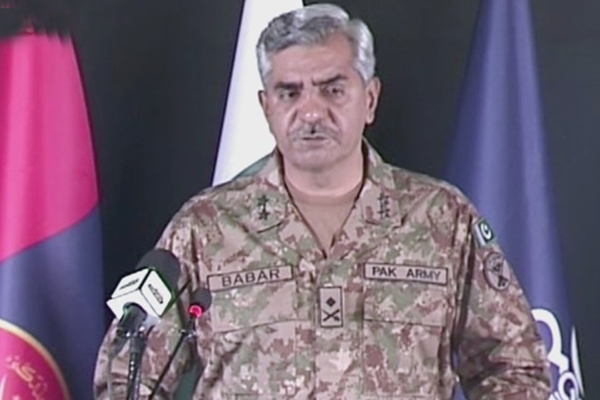
File photo
Maj. Gen. Babar Iftikhar says India trying to slow down Pakistan’s progress through military, disinformation campaigns
Admitting that disinformation on social media is a “major challenge,” Pakistan Army spokesman Maj. Gen. Babar Iftikhar has claimed that the best way to counter it is with transparency and credible information.
“The best way to handle [fake news] on social media is transparency, not leaving any information voids, and passing on credible information. That is exactly what we are doing,” he told Global Village Space in an interview. “[Disinformation against Pakistan] is, unfortunately, a major onslaught. It is a major part of the fifth-generation warfare against Pakistan and we are aware of that,” he added.
The director-general of the Inter-Services Public Relations (ISPR) claimed India, as part of fifth-generation warfare, was targeting Pakistan in the diplomatic, economic, and information domains. “India is trying to target Pakistan from different directions to slow down our progress as well as the trajectory that we have for the future,” he said, adding that the Indian media’s indulging of such fake information had resulted in it losing its credibility “to a large extent.”
Dossier
The interview largely revolved around a dossier that Iftikhar and Foreign Minister Shah Mehmood Qureshi unveiled last month. In it, Islamabad provided “irrefutable” evidence of Delhi funding and fomenting terrorism in Pakistan in a bid to destabilize the country and hurt the China-Pakistan Economic Corridor.
To a question on how the international community had reacted to the dossier, the ISPR chief said it had been “very well received,” and had vindicated Pakistan’s long-standing stance.
“The world has taken notice of it; the world is talking about it,” he said, noting that Delhi’s “best efforts” had failed to halt the objective analysis of what had been revealed in the dossier. He said the Foreign Office had already presented the dossier to the P5 nations—China, France, Russia, U.K., and U.S.—and the U.N. secretary-general.
To a question on whether Pakistan had talked to Afghanistan about India allegedly funding militant hideouts on its soil—as revealed in the dossier—the armed forces’ spokesman said it was an ongoing process. “We’ve always acknowledged that the Afghan government has capacity issues and we’ve never blamed them for what’s happening from the Afghan soil,” he said, adding that all information had been shared at the appropriate levels.
CPEC
The dossier has alleged that Indian P.M. Narendra Modi is personally overseeing a cell tasked with damaging progress on the China-Pakistan Economic Corridor. To a question on how the armed forces were ensuring the security of CPEC projects, Maj. Gen. Iftikhar said Indians realized that the Belt and Road Initiative was a “game-changer” for the region. “With it, Pakistan becomes a connectivity hub for this whole region,” he said, adding that it had the potential to bring prosperity to all of Asia.
“Somewhere they [Indians] decided there was a timeline of this project beyond which it would become irreversible,” he said, claiming that Delhi felt it had to halt the project before that point was reached. To another question on whether this meant India was advocating against regional prosperity by destroying CPEC, the Army spokesman said: “If they’re not willing to let this project progress, then that’s what they’re trying to do here.”
The Army spokesman said Pakistan had raised two divisions in addition to 8-9 regiments to protect CPEC projects. He said China had been “very satisfied” by these measures, and claimed India’s real target was the international image of CPEC. “Terrorists being used to target CPEC have been continuously trying to target Chinese workers, local labor,” he said. “But our measures have prevented them [India] from even denting the progress of CPEC,” he said. “It’s progressing more every day,” he added.
Kashmir
Referring to a recent surge in Indian ceasefire violations along the Line of Control, Maj. Gen. Iftikhar said it was an attempt to externalize the internal affairs of India. “India has been continuously try to tag the indigenous freedom struggle as terrorism,” he said, adding they were also trying to link that terrorism with infiltration from Pakistan.
Noting that India had 900,000 soldiers deployed in India-held Kashmir—as compared to 600,000 total active soldiers in the Pakistan Army—Maj. Gen. Iftikhar claimed Delhi was trying to divert global attention toward Pakistan by claiming that any violence inside the disputed region was a result of infiltration and terrorists coming from Pakistan. “This is absolutely false,” he said.
“They understand that whether they fire on us, or we fire on them, the victims are the Kashmiris. So it is also an attempt to drive a wedge between Pakistan and the people living along the LoC,” he said, claiming that India was always looking for an excuse to raise temperatures, including through false flag operations.
“We’ve always sought to normalize the situation in the region because of its potential,” he said, but said India was unwilling to reduce tensions.
Balance of power
On growing security links between the U.S. and India, he said their agreements offered Delhi access to advanced technology and classified information that upset the balance of power in South Asia. “We are aware of what they are acquiring and are prepared for it,” he said, but warned that the global community must understand that any major disturbance in the power balance was a threat not only to South Asia, but the entire world.
Coronavirus
To a question on the armed forces’ role in coping with the pandemic, the ISPR chief said the Pakistan Army had been part of every effort to control the virus’ spread. He said the military been deployed nationwide to aid in lockdown efforts.
“As far as the second wave is concerned, we have enhanced our ability to fight the virus in a better way so we should tackle it well,” he said, and praised front-line workers and the media for their role in helping educate the country about the virus and its preventative measures.
